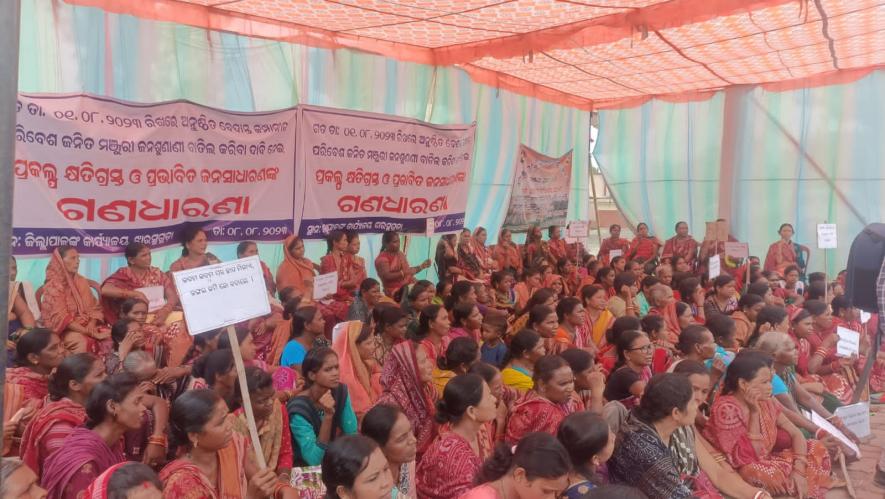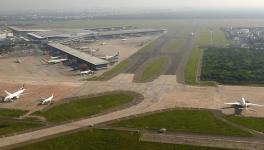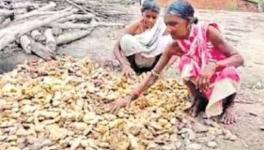Vedanta’s Odisha Coal Project Public Hearing ‘Bars’ Most Locals

Local communities of around six villages of Odisha’s Jharsuguda district demonstrate near the collectorate demanding the scrapping of the public hearing for Vedanta Group’s proposed Rs 2,000-crore coal mining project on August 8. Image credit: Special arrangement
New Delhi: The Odisha government allegedly botched up a public hearing of local communities for a Rs 2,000-crore coal mining project proposed in Jharsuguda district by billionaire businessman Anil Agarwal’s London-headquartered Vedanta Group.
On August 1, the Naveen Patnaik government went ahead with the hearing even as many people scuffled with the police demanding entry into the meeting venue. Further, it has been alleged that the state government conducted the hearing despite being informed about several shortcomings in the project’s environmental impact assessment (EIA) report.
On August 8, representatives of local communities of around six villages of Jharsuguda demonstrated near the collectorate demanding the scrapping of the public hearing. While Vedanta Group has stated that it will start the project considering local communities’ welfare, the district administration claims ignorance about the goings-on outside the meeting venue.
“A very large number of local people were not allowed into the public hearing, held in Pipilimal. We were barricaded, at least, 2 km away from the meeting venue by the police, paramilitary forces and goons. They told us the meeting venue was already full,” Gopinath Majhi (67), from Jaiguria (Bartap) village, told Newsclick
“Though our vehicles were stopped midway, they allowed only those vehicles numbered beforehand with certain codes. Nearly 90% of attendees were from outside the three panchayats that will be affected by the project and were ferried to the venue in rented vehicles.”
The EIA report, based on which the public hearing was conducted, allegedly furnishes insufficient information about the likely human, ecological and livelihood cost of the proposed project. Days before the public hearing, activists had written to the state pollution control board that the report was incomplete in several aspects.
The project envisages extracting 8 million tonnes per annum (MTPA) coal using the opencast method from the Kuraloi-A North block, allocated to it for commercial mining by the Narendra Modi government in June 2021 following an auction. The mining lease area is spread over 965.58 hectares, of which more than 500 hectares is private land—in Pipilimal, Dhauramunda, Kuraloi, Belpahar, Banjari and Bartap villages, in Lakhanpur tehsil.
The block contains around 1,848.25 million tonnes of coal reserves, and the government approved the mining plan in August 2022.
The lease area comprises 255.23 hectares of agricultural land in these six villages while another 37.89 hectares proposed to be taken over have traditionally been used by local communities for grazing cattle and other livestock.
As per the EIA report, 15.54 hectares of the lease area is covered under waterbodies while 205.17 hectares of forestland, on which local communities have been dependent for minor produce for generations, will also be diverted. The project proponent is yet to get clearance for forestland diversion.
Majhi said that his family would lose nearly 5 hectares of agricultural land and a house. Local communities allege that a significant portion of the private land earmarked for the project belongs to Adivasis. Families from Gond, Munda and
Bhuyan communities are among the Scheduled Tribe population of the region.
The project will directly or indirectly affect the livelihood of nearly 5,000 families from around 15 villages in the area, it has been further alleged. Though a resettlement and rehabilitation study is yet to be done, the Vedanta Group has indicated that nearly 1,235 persons will be employed in the project.
“We have opposed the mining project right from its inception. There are coal mining projects nearby, but those belong to a government company. We were against handing out the block to a private company because it would value its profits over people. The number of people who will get jobs in the project will be far less than those who will lose their livelihood by the takeover of our forests, agricultural land and water sources,” added Majhi.
The project will also affect a portion of municipal ward No. 17 in Belpahar town. Several residents of Belpahar participated in the public hearing.
Belpahar municipality chairman Nimai Charan Pand said that though local people are not opposed to industrial development, the project will be opposed tooth and nail in the future if the proponent does not consider the concerns of communities over safeguarding livelihoods and the region’s ecology.
“We are not opposed to any development project. But the track record of Vedanta is fairly well known. If concerns of local communities are not taken care of, there will be massive opposition to the project in the coming days,” Panda told reporters.
A senior administration official informed Newsclick that a delegation of representatives of local communities submitted a memorandum of their grievances on August 8.
“Since we were presiding over the meeting, it will not be possible to comment on what transpired outside. Anyone not allowed into the public hearing can always seek redressal from a higher forum,” the official said.
Jharsuguda’s district magistrate Aboli Sunil Naravane and superintendent of police Parmar Smit Parshottamdas did not respond to repeated calls and text messages seeking their responses to the allegation.
A major concern of local communities regards a project proposal for diverting a water stream, Lilari Nallah, by constructing an artificial canal. The perennial
stream, which originates from the nearby hills and drains into the Ib River, in western Odisha, flows for 18.17 km before entering the proposed mining lease area.
According to the EIA report, 3.16 km of the stream flowing through the mining lease area will be diverted after the state’s water resources department approves a plan. Another water stream, Hinjankharu Jhor, which is seasonal and flows in the easterly direction to join the Lilari Nallah at the centre of the coal block, is also proposed to be reorganised.
As many as 17 water bodies, including the Ib River, four major streams and 12 minor streams fall within the 10-km radius of the lease area.
“The EIA report mentions half the truth only when it states that the Lilari Nallah flows in the middle of the mining lease area and that it will be diverted by constructing an artificial canal. This is a gross violation of rules and laws preventing disturbance or obstruction of the natural flow of water,” said noted environmental activist Prafulla Samantara.
Notwithstanding the opposition of local communities and activists to the proposal for diverting natural water bodies, the Union Ministry of Environment, Forest and Climate
Change had cleared several proposals to divert dynamic water bodies for coal mining without even conducting a hydrological study.
“Furthermore, it has been stated that Hinjankharu Jhor (minor canal), which merges with Lilari Nallah in the middle of the coal block, will be reorganised. Hinjankharu Jhor will be obliterated after mining commences. Many streams will be affected by opencast mining. All these natural streams will disappear during and after mining, resulting in irreparable loss and damage to the Ib River, an important tributary of the Mahanadi River,” added Samantara.
“While the disappearance of existing streams will create water scarcity in the Ib River, opencast mining and coal transportation will pollute it. There will be a loss of biodiversity and the environment around the mining lease area,” he further added.
In a letter written to the Odisha State Pollution Control Board, at least, three days ahead of the public hearing, Samantara had highlighted, among other issues, that the EIA report did not accurately provide air quality monitoring data for the proposed project.
“Complete data of baseline ambient concentration monitored at the 10 sampling locations have not been provided but only the ranges … No details have been provided about the predicted ground level concentration of AAQ [Ambient Air Quality] parameters due to the project. The IB valley is a highly industrialised zone where cumulative environmental impact assessment is required, but the report is silent on any such study,” the letter read.
The letter also pointed out that the report was “silent on the likely environmental impact of largescale diversion of forestland”, like loss of biodiversity, flora and fauna, which has been proposed for the project.
A Vedanta Group spokesperson told Newsclick that the mining project will be undertaken considering the principles of sustainable development.
“Any mining operation shall be as per regulatory provisions and within extant laws after obtaining all statutory clearances and adhering to the highest standards in sustainability and community welfare,” said the spokesperson.
Get the latest reports & analysis with people's perspective on Protests, movements & deep analytical videos, discussions of the current affairs in your Telegram app. Subscribe to NewsClick's Telegram channel & get Real-Time updates on stories, as they get published on our website.
























